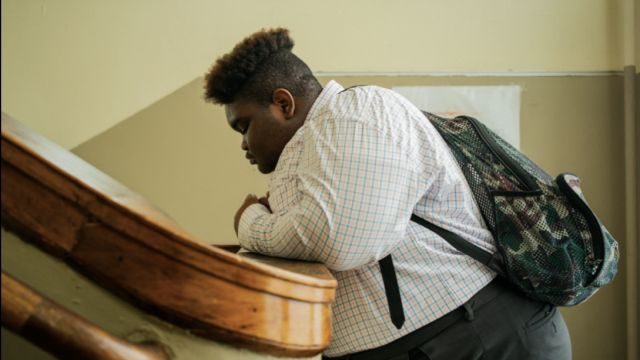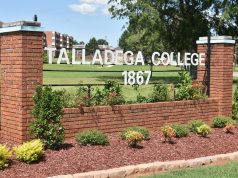
By Donna Cope
Alabama News Center
“My light bulb busted, but I still manage to shine bright;

Even broken crayons still color
There’s no reason to dim your own light.” – “Hi” by Keion Gilmore, 2020
At 17, Keion Gilmore is ready to run his race.
Like many young people, Gilmore relies on the advice of teachers and friends to help guide him. As a freshman at Ramsay High School, Gilmore recalled asking his ninth grade English teacher for advice. When he felt down, Gilmore said that Ramsay educator Montrice Young buoyed his spirits while providing a different point of view.
“I always got bullied about the way I talk and my weight, and my sexual orientation,” said the soft-spoken Wylam resident.
“Now, I would tell people, ‘Don’t let what they say make you harm yourself,’” said Gilmore, a rising senior at Ramsay, one of three magnet high schools in Birmingham. “Why would they do this? Because they don’t love themselves, and they probably don’t have the things you have.”
Gilmore talks about his experiences being bullied at school in “All In,” a documentary that explores the relationships between Birmingham City Schools students, teachers, and community and educational leaders. By writing poetry, Gilmore works through his feelings about his deceased father, and discusses everything from Black history to flowers and raindrops.
The making of ‘All In’
Created in concert with the Birmingham Education Foundation and 1504, the film spotlights community engagement stories. An immersive exhibit at Ramsay High School June 15-22 works in tandem with the film to showcase students’ high school experiences during the pandemic. Limited seats are available at Eventbrite.
“We’ve created the stories as told by the students themselves,” said 1504 filmmaker and writer Tyler Jones, who has led more than 40 projects worldwide. “The people we’ve really highlighted in this documentary are the students, parents and teachers. This is more of a conversation about how we can educate the general community to support education.”
The film, directed by Jordan Mahy, serves as a platform for community advocates while championing the work of educators.
“The advocates highlighted in the film are relentless in their efforts to improve the Birmingham community,” said Meryem Tunagar, Community Engagement manager at the foundation, whose mission is to put students first and ensure they graduate ready for life, college and careers.
The Sidewalk Cinema Film Center in Birmingham is previewing the documentary, with free seats available on Thursday, June 17 at 4 p.m., and on Friday at 2 p.m.
“I would hope that anyone who is a supporter of our schools and our students will attend,” Jones said.
School advocate shares her story
The way Daphne Ballard sees it, if you have a good village around you, you can thrive.
For years, Ballard has advocated for Birmingham schools. When she heard about the “All In” project, Ballard saw a wonderful opportunity for stakeholders and was thrilled to take part in the documentary.
“It’s not just about my children – it’s all the children in our community,” she said. “What can I do to make the environment better? I truly think if you don’t work to make it better, it will come back to bite you.”
She is proud that her 21-year-old daughter, Brooklyn, is a senior at Yale University in Connecticut, majoring in political science and educational studies.Ballard is happy that all her children – ages 32 to 10 – attended Birmingham City Schools: Brandon, Bryson, Brenna, BreNyah, Brielle, Brenton, BreAnn, Brooklin, Brian, Brailyn, Brandalyn, Brionna, Bradford and Brittani. Two children currently attend Ramsay High School and William J. Christian Elementary School magnet facilities.
“Brooklyn would miss lunch and get tutored to get help in subjects she wasn’t as strong in,” Ballard said. “She had resources and opportunities at Ramsay High School – she had so much support. Being on the Speaks First debate team helped her in applying to Yale.”
Ballard said that her older children received an excellent education at Minor Elementary School.
“Minor wasn’t a magnet school, but it was one of the best experiences, from the support to the administration to the teachers,” she said. “My children were there 17 years, consecutively. Just the way the school worked with me, they were like family. It was like a protective place for my children, and they were very supportive. They had amazing teachers.”
Though Ballard’s household is doing well, she can’t be content. The crime rate in Birmingham grieves her, as well as the sight of the homeless. In the documentary, she discusses issues that prevent students from progressing.
“You have to put aside personal and political agendas for the betterment of our children,” Ballard said. “When are we going to make the necessary changes to help everyone? If we come together as parents, teachers, leaders, the mayor and all of his people, the church working together for the betterment of our communities, we can get somewhere.
“We get so many new school buildings, but when can I know my sons won’t be bullied in school?” she said. “I don’t want my kids to face the peer pressure. … Don’t give up and you can make a difference.”
The goal is to improve education
In August 2018, Tunagar helped launch the “All In” information-gathering campaign to better understand the experience of families and students in Birmingham.
The Birmingham Education Foundation created the “All In” campaign, with full support from Birmingham Mayor Randall Woodfin and Lisa Herring, who was Birmingham City Schools superintendent from 2017 to 2020.“The overall goal of ‘All In’ is to educate communities about what’s going on in Birmingham City Schools, which so often can be viewed with negativity but there’s so much incredible work that goes on,” Tunagar said. “We wanted to show the beauty and talent that exists in Birmingham.”
The foundation launched a yearlong phone polling effort, asking residents about what they wanted to see for Birmingham school students. Focus groups discussed teacher quality, engagement with school administration, mental health and parental involvement.
“We want to see the needle move for more of our students,” Tunagar said. “By learning about the experiences of families and students in Birmingham, we’re ensuring that our work, in programming and for policy and advocacy, aligns with the desires of our community.”
She expects the foundation’s work to evolve along with the needs of families and students. There are plans to launch a community toolkit as a springboard to “intentional conversations” by neighborhood associations, the Birmingham City Council and the Birmingham School Board.
“We want to connect families with the entities they need,” Tunagar said. “This is to celebrate the journey we’ve gone on together. Big-picture-wise, the best part is while this documentary may show where we started, it’s still impacting work with the communities. This striving for connection is very important – the work is never done, it’s endless. We are working for equity and to drive empathy, and it’s always worth it, in the end.”




